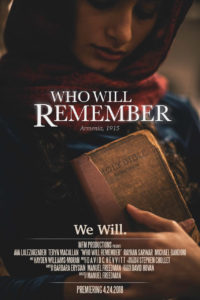By Barbara Erysian & Manuel Freedman Based on the story of the writer’s Grandmother
 WHO WILL REMEMBER is inspired by the true story of Barbara’s grandmother, Alice Zacharian, a survivor of the Armenian Genocide of 1915. The screenplay recounts her grandmother’s struggle as well as the stories of countless other survivors and witnesses. The intention of this screenplay is to honor all those who perished 100 years ago and to pay homage to her grandmother’s final plea, “Never Forget.”
WHO WILL REMEMBER is inspired by the true story of Barbara’s grandmother, Alice Zacharian, a survivor of the Armenian Genocide of 1915. The screenplay recounts her grandmother’s struggle as well as the stories of countless other survivors and witnesses. The intention of this screenplay is to honor all those who perished 100 years ago and to pay homage to her grandmother’s final plea, “Never Forget.”
During the Armenian Massacre, a story of love and survival unfolds. ALICE, a 16 year old girl, and JACOB her younger brother, witness the shooting death of their grandfather, PAPIK. Their father, ARMEN, takes the children to a church sanctuary where he believes they will be safe from Turkish soldiers. However, chaos erupts when the soldiers raid the church.
After escaping the burning church with the help of a young Turkish Soldier, Alice and Jacob join a convoy of women and children who are forced into the Syrian Desert without food or water. They are rescued by two humanitarian neutral parties. They take them to an isolated orphanage where they are given care and shelter by Swedish Missionaries, MOIRA and BJORNE.
Life in the orphanage is not without its challenges. The children show scars of torture and abuse. Moira is emotionally drained and physically ill while Bjorne lives in denial of the imminent danger. Alice assumes Moira’s responsibilities of cooking, cleaning and caring for the young children but that is not all.
Meanwhile, GARIP and TAMIR, young Turkish soldiers and brothers, have been ordered to cleanse the area of all Christians. They travel throughout the region as they both witness and commit horrific acts of violence. Garip, the stronger-willed, older brother, justifies the massacre by believing the will of god cannot be stopped. In stark contrast, Tamir, sympathetic to the Armenians, reluctantly follows his brother’s lead but struggles with the orders he’s been given.
When Garip and Tamir discover the orphanage, Garip demands that all the children be converted to Islam. Bjorne is unwilling and Moira is unable. Alice, a devout Christian, reluctantly agrees to convert in order to spare the lives of the small children. Thankfully, RAS, a young Assyrian man, brings supplies and medicine to the orphanage but also knowledge of Islam. With his guidance and support, Alice is able to teach the children the Islamic prayers and rituals. In spite of the impossible situation, Alice and Ras fall in love.
When Tamir and Garip return to the orphanage, Tamir tries to rescue Alice and Jacob. His plans are thwarted by Garip who secretly tries to poison the orphans. After poisoning the children fails to kill them all, Ras and Alice lead the remaining able-bodied children away from the orphanage. By an unfortunate twist of fate, Bjorne leads the soldiers directly to the children. When Ras hears gunshots, he leaves Alice and the children hiding and confronts Garip and Tamir in a fatal showdown.
Alice, now alone with the children, must find the courage and strength to survive. She guides the children through the treacherous mountains careful to avoid the Turks and the Kurdish tribesmen. Despite unbelievable odds and extraordinary hardship, Alice and the children walk out of the nightmare and arrive back in the Syrian Desert.
After they are rescued by an American missionary, Jacob asks Alice why they survived when no one else did. When she doesn’t reply, the answer comes to him, “Because someone has to tell our story.”
“Like all tales of war, especially those involving the massacre of an entire people, this story continues to tell the tragedy of mankind in the hopes that we will learn from the mistakes of our past.”
—Nicholl Fellowship Feedback.